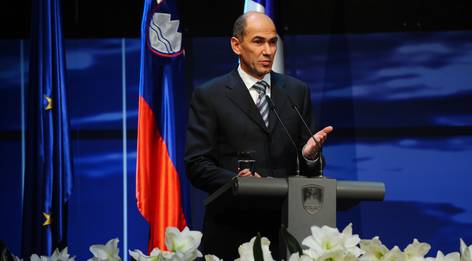NEWS
Prime Minister on the occasion of a Europe-wide Day of Remembrance for the victims of all totalitarian and authoritarian regimes
Each nation has its own history. A history with bright and dark chapters. As the greatness of an individual is reflected in his attitude towards weak and narrow-minded human nature, a nation's attitude towards dark events in its history reveals how mature this nation really is. The dark chapters in the history of the Slovenian nation after the Second World War are tainted by killings, political processes, repression, fear, political indoctrination, pressure and opportunism. Families were divided and a rift was created in our nation. A nation that survived such an ordeal but has not come to terms with it, has no sound foundations. With dignity and sensitivity we should find a way and leverage to banish fears instilled in people. We should find answers to questions that have been left unresolved, and make the necessary steps towards the moral rehabilitation of society.
As a society we should never again succumb to biased explanations of history, intolerance and disregard for different views, and again embark on the path of exclusion and intentional incitement to hatred. Not only on this particular day, but everyday, our society should ask itself why it still has not gone through self-reflection and subsequent catharsis. The traumatic experience of the Slovenian nation cannot and must not be simply erased from our conscious or, in the words of Italian philosopher Benedetto Croce, no generation has the right to stop seeking the truth, reconciliation and remorse for the crimes of the past.
Hence, it is our historic duty to recognise injustices and acknowledge mistakes, condemn wrongful deeds, and to request that those who, in the name of totalitarian ideology, sent thousands to their death, caused the suffering of several generations and inflicted on the nation many wounds that are not easily healed, are brought to account for their deeds. It is also our moral duty and responsibility to the victims of a totalitarian regime to bury all our deceased with dignity and pay tribute to them. Even much less civilised peoples allowed their enemies to do so. This is something that we should have done a long time ago for the souls of those killed and their families as a step towards reconciliation.
The Slovenian Government did not proclaim 23 August as a day of remembrance for the victims of totalitarian and authoritarian regimes in order to open discussions on ideological topics but in view of the rule of law and civilisation's elementary attitude towards all the paths of the 20th century leading astray and leaving millions of victims and destruction in their wake. It is therefore only proper to reflect and admit that as a society we should have done more to adequately sanction crimes from the past. It is even more important in this trying time that we do not fail "the solidarity exam" and "slip into ignorance" as Drago Jančar put it. A nation that has not come to terms with its past, and for this very reason continues to be divided, cannot build the present and set foundations for a better future.
Three years ago, the European Parliament adopted the Resolution on European Conscience and Totalitarianism in which it expressed respect for all victims of totalitarian and undemocratic regimes in Europe and paid tribute to those who fought against tyranny and oppression. The Resolution also highlighted the importance of keeping the memories of the past alive, and strongly and unequivocally condemned all crimes against humanity and the massive violations of human rights committed by all totalitarian and authoritarian regimes. Every democrat in Europe should automatically reject all totalitarianisms and not attempt to justify any of them.
Pierre Mendès-France wrote that "democracy is foremost a state of mind." By observing this day in a suitable manner – in debates sparked by this Remembrance Day for which I can only hope that they will not create rifts but pay dignified and unbiased tribute to the victims of crimes – we, as a nation, can show ourselves and others the state of mind prevailing in our country. We can prove that we understand Drago Jančar when he says that "public conscience of democracy also stems from the knowledge of the errors of communism or any other totalitarianism".
In the light of this, I am still hopeful. As hopeful as Anne Frank who as a child suffered the horrific ordeals of the Second World War and believed "that people are truly good at heart."





